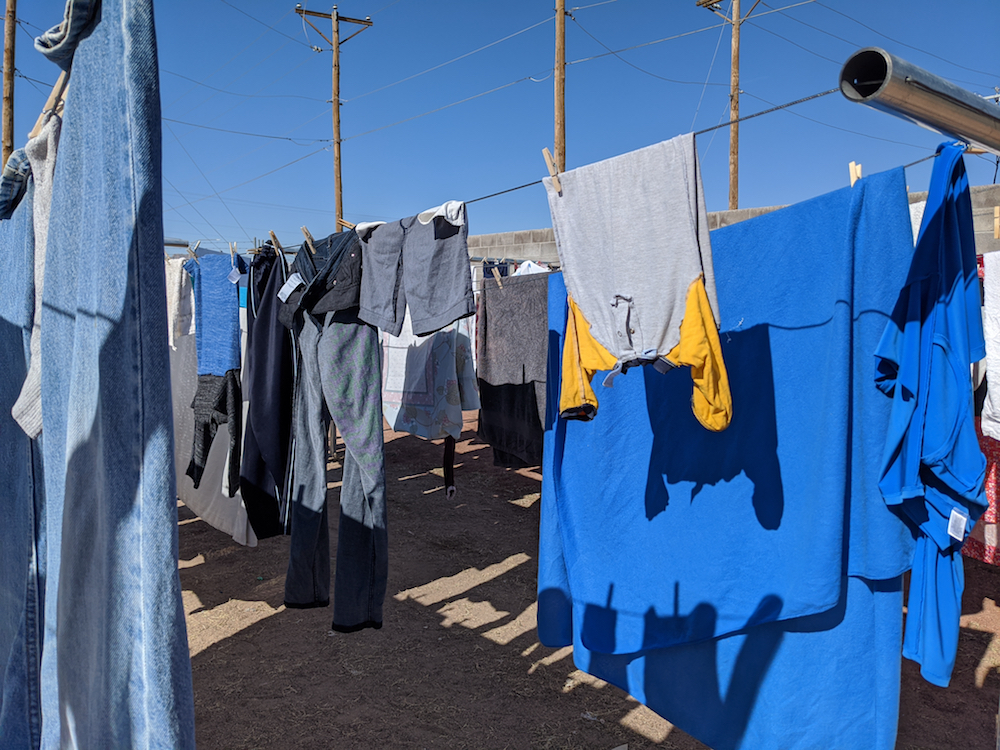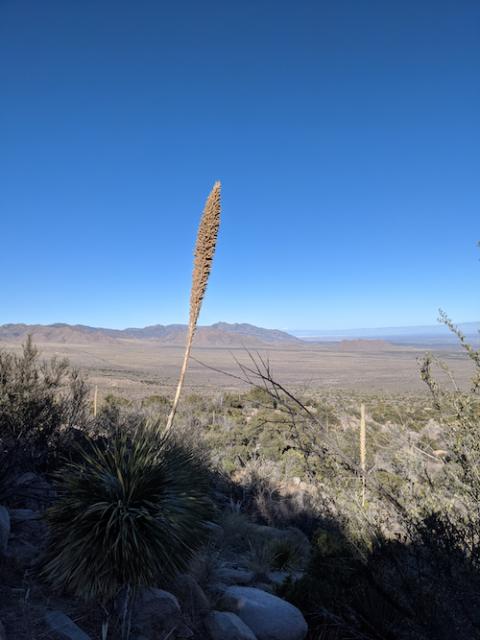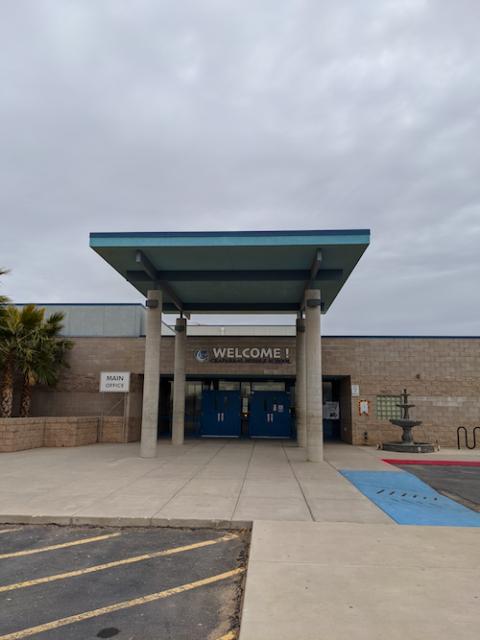
I was hanging laundry to dry at Annunciation House when one of the guests, who was previously relaxing outside, rushed over to help me. She shared stories of her journey while we took our time pinning up the clothes, sheets and towels. (Samantha Kominiarek)
Editor's note: Notes from the Field includes reports from young people volunteering in ministries of Catholic sisters. A partnership with Catholic Volunteer Network, the project began in the summer of 2015. This is our 10th round of bloggers: Honorine Uwimana is a St. Joseph Worker in Orange, California, and Samantha Kominiarek is an Assumption Mission Associate in Chaparral, New Mexico.
Throughout the first few months of my year of service, I felt incredibly overwhelmed by all the heartbreaking stories full of trauma. The information was difficult for me to process.
After many hours of reflection, conversations with family and friends, and time to consider these experiences, I began to notice that these same stories were also stories of resilience.
On Mondays, I go to Casa Óscar Romero, one of the Annunciation Houses that provides hospitality to migrants and refugees in El Paso, Texas. People are welcomed here to have a safe place to sleep and delicious food to eat, and volunteers assist with future travel plans and the general well-being of the guests. Some guests have just been released from U.S. Immigration and Customs Enforcement, some are waiting for the flight or bus to their sponsor somewhere else in the United States, and some appear to be in limbo because of a lack of the proper documents.
Each week, I look forward to the hugs from some guests with whom I have established a closer relationship and to the friendly new faces I will get to know throughout my shift. The guests are required to help cook meals and do chores, but they are always eager and ready to help. They truly want to contribute to this community at Casa Óscar Romero.
Each shift, I am grateful for the phone calls I receive. Many people in the El Paso community and beyond want to give what they can to Annunciation House. Some ask what urgent needs we have for food and supplies, and others wonder how they can sign up to volunteer.
Advertisement
Whenever I have some free time, I love to play with the children in the sala. Sometimes we sing "¿Estrellita Dónde Estás?" or we play piedra papel o tijera (rock, paper, sciccors) together.
Sometimes they even teach me a new card game! My time with them is what brings me the most joy. At first, it was what brought me great fear because I was imagining the trauma they had gone through on their journeys here. Now, I see the resilience in the children's souls. They are here, living and teaching me new card games despite it all.
On Tuesdays, I go to Las Americas, an immigrant advocacy center in El Paso. There, I volunteer with the Detained Deportation Defense Program, assisting lawyers and paralegals with their clients who are currently being detained.

This is the mural on the front of the Las Americas building in El Paso, Texas. It was painted under the direction of Jesus "Cimi" Alvarado from the Centro de Salud Familiar La Fe by 10 people, ages 15-17, who were under the supervision of the El Paso Juvenile Probation Department. It includes "symbols like farm workers, monarch butterflies, and the Statue of Liberty all help pay homage to immigrant rights and dignity for all humans," the Las Americas website says. (Samantha Kominiarek)

One of my favorite times to reflect is when I am in nature. I loved this beautiful hike through the Organ Mountains in Las Cruces, New Mexico. The fresh air and beauty of the world provides so much clarity for me. (Samantha Kominiarek)
Sometimes, I work on preparing materials for clients' court dates, such as creating a report on what it is like to part of the LGBT community in Honduras: I look up news articles that show how dangerous it is for people in this community to live in Honduras because of the amount of violence and persecution they face.
Other times, with Rosa, the lead paralegal at Las Americas, I visit clients in detention centers. Some visits involve meeting with potential new clients to see if Las Americas would be able to represent them. Others consist of preparation for the credible-fear interview that an asylum officer will give to determine whether or not the clients have a credible fear of persecution or torture in their home countries and should be granted asylum.
The stories they share are difficult to hear and imagine. The way they are treated at the detention centers is inhumane. However, they are here, living and hoping and fighting for a better life despite it all.
On Wednesdays, Thursdays and Fridays, I go to Chaparral Middle School, where I am assisting in seventh-grade classrooms. My students are sweet and really want to receive an education.
Right now, they are preparing for a New Mexico state test in which they have to respond orally to questions on the computer. This will be challenging for them, as speaking to a computer is not natural for anyone, but it is also difficult for them since many of them do not feel confident in their English-language abilities.
I remember having to do a task like this in my middle-school Spanish classes. To prepare, the Spanish teacher would have a brief one-on-one conversation with us in the hallway so we could practice answering in complete sentences by restating the question and providing evidence. I found this helpful, so I asked Mrs. Ochoa, one of the seventh-grade English language arts teachers, if I could practice in this same way with the students.
Meeting one-on-one with the students has allowed me to understand much more about them: which animal they feel represents them, how they spent their most memorable birthday, their favorite recipe that has been passed down in their family. Through these silly questions, I learn what qualities they are proud (or not proud) of, and I learn more about their families through the traditions that exist in their homes.

The doors to Chaparral Middle School, which my students enter each day as they are welcomed into a place that will continue to support their education. (Samantha Kominiarek)
At the end of our conversations, I always ask, "Is there anything else that Mrs. Ochoa or I can do to help you feel more prepared for the test?" Sometimes, they have specific requests, but mostly, they ask to be encouraged to participate more in class so they can develop their self-confidence. Many students are hesitant to respond orally in English in front of their whole class, so leading a whole class discussion can be difficult. However, these conversations made me realize that these students want to be pushed and encouraged more to use their English. They could give up because learning a new language is not easy, but they don't because they are here, living and yearning to learn despite it all.
The people who share their hearts with me invite me into the difficulties they have endured. I acknowledge those challenges and work to bear witness to their journey. I also bear witness to the resilience that is so present and evident in their hearts and in their smiles — despite it all.
[Samantha Kominiarek is doing a year of service with the Assumption Mission Associates in Chaparral, New Mexico.]







